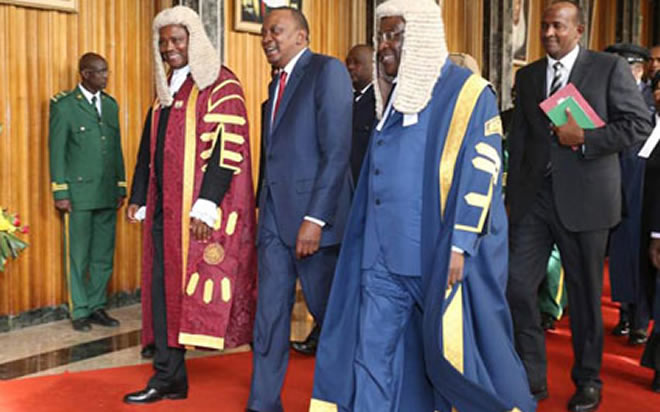
President Uhuru Kenyatta, National Assembly Speaker Justin Muturi and Senate Speaker Ekwee Ethuro leave the National Assembly chamber after the President gave his the State of the Nation speech on March 26, 2015.

Friday, March 27, 2015
When President Kenyatta started his second State of the Nation Address Thursday, it was easy to imagine what more that could go unresolved.
But Kenyans saw a bold, resolute and fearless President, remarkably different from the one who, in his two years in State House, made promises but few of which, if any, were acted upon.
The second paragraph of his speech gave an impression that the President would cover up, scratch here and there and assure Kenyans that all was well.
“As we approach my second anniversary as President, I am pleased to report that the state of our nation is strong. Our economy is growing robustly. Our nation is more secure, and our place in the community of nations is respected,” he said.
Given that the speech was delivered against the backdrop of worrying reports of insecurity, rising corruption, high prices of basic commodities and a more divided nation, one could not suppress an opinion that his speech writers were playing games with him.
President Kenyatta and his deputy William Ruto must have asked themselves why the voices across the country were pointing to things that they should correct as they mark two years of their presidency.
Just like a general in a battle field pauses to seek new tactics to bring down his opponents, time had come for the President and his deputy to adopt new ways of tackling runaway corruption, insecurity, growing disunity, healthcare, devolution, joblessness, and the mismatches in the education sector.
UNDER PRESSURE
However, he divided his speech in three parts — the achievements, the challenges and the way forward. He gave a review of the achievements in each sector, key among them major infrastructure projects, the positive economic figures, his support for devolution and wide ranging reforms which were contained in the Jubilee manifesto.
But the President was alive to the fact that his government has never been under pressure from the opposition, civil society and the public to act on insecurity, corruption and national cohesion.
“This progress notwithstanding, our country is today faced with a number of daunting challenges that slow our progress, obscure our achievements and chip away at the legitimacy of the state,” he said.
Even though he stated that the government has achieved 70 per cent in digital migration, he acknowledged the position that has been taken by media houses under the African Digital Network (ADN).
“We as government are willing to work with all stakeholders in the endeavour to grow a vibrant and prosperous broadcasting sector,” he said.
He was more specific on insecurity — the challenges posed by terror group Al Shaabab; the spectre of various forms of international crimes; overhauling of leadership in security sector and equipping the security organs.
Displaying the bolder side, the President confronted national disunity which has its roots in historical injustices that have been meted against certain communities since independence.
He referred to past assassinations, torture and detentions without trial, abuse of human rights and election related violence, especially the 2007/8 post-election violence for which he was taken to The Hague for crimes against humanity. His case has since been terminated. “Collectively, these incidents have disunited us and held our people hostage to this tragic history by providing the foundation and rationale for the cynical and destructive politics of hate and division,” he said.
He brought a close to the post-election violence cases by directing that a Sh10 billion fund be established to compensate victims and asked Parliament to debate and pass the Truth, Justice and Reconciliation Commission report.
He led by apologising on his own behalf and that of past governments the injustices that Kenyans have been forced to endure under various regimes.
“I stand before you today on my own behalf, that of my government and all past governments, to offer the sincere apology of the Government of the Republic of Kenya to all our compatriots for all past wrongs…I seek your forgiveness and may God give us the Grace to draw on the lessons of this history… to unite as a people and, together … embrace our future as one people and one nation,” he said.
Taming corruption
If he was bolder on national cohesion, he was more harsh and unforgiving when it came to taming corruption. He expressed his disappointment at public officers for dipping their hand in the till and directed that regardless of their rank, they should face the law.
President Kenyatta drew the line on the sand and said “one will stand between Kenyans and what is right in the fight against corruption and other monstrous economic crimes”.
Without fearing the political implications, he asked public officers, regardless of rank, who are under investigations for corruption to step aside.
In a clever way, he made public their names by attaching a report of the anti-corruption commission chief executive officer Halakhe Waqo on investigations.
“I hereby direct that all officials of the national and county governments that are adversely mentioned in this report, whether you are a Cabinet Secretary, Principal Secretary, or Chief Executive of a state institution, to immediately step aside pending conclusion of the investigations of the allegations against them. I expect the other arms of Government, namely the Legislature and Judiciary, to do the same,” he said.